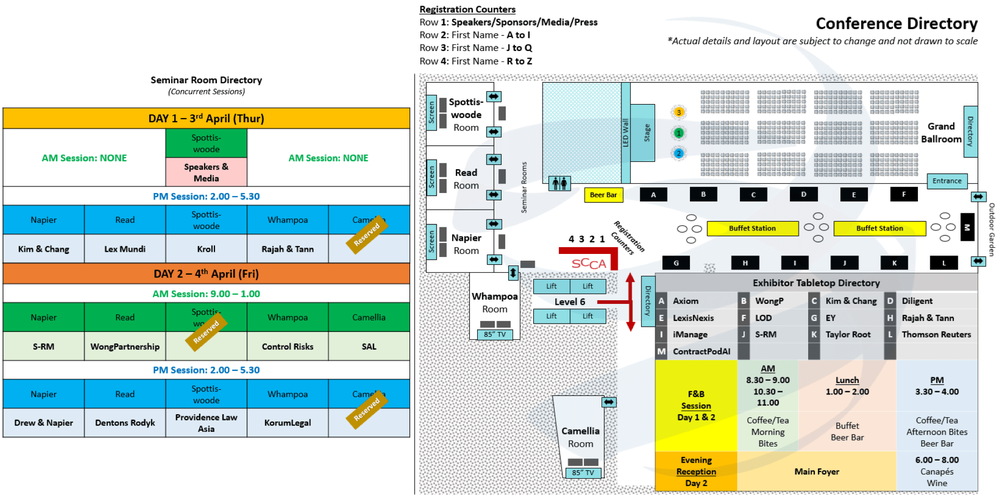
- Registration & Refreshments
- APAC Legal Congress Welcome
- Opening Show Performance
- SCCA Co-Presidents Welcome Message
- Opening Keynote by Guest of Honour
- MOU Signing Event
- The Agile Legal Function: Navigating Complexity in a Fast-Changing World
Faz HUSSEN•Gladys CHUN•Catherine KEMNITZThis panel explores how in-house legal teams can transform their operations to adapt to the dynamic demands of today’s business environment. The session examines the principles of agility in legal processes, emphasising flexibility, speed, and collaboration as critical enablers for success. It highlights strategies for streamlining workflows, integrating technology, and fostering cross-functional partnerships to effectively manage risk while driving innovation. Through real-world examples and expert insights, delegates will gain practical ideas to navigate complex regulatory landscapes, anticipate disruptions, and deliver proactive legal solutions that align with organisational goals. This discussion positions the agile legal function as a cornerstone of resilience and growth in an era of rapid change.
- Coffee Break & Networking Session
- The Trump Era: What Lies Ahead for the APAC GC?
Samuel HUEN•Ameera ASHRAFIn an era of rapid globalisation and technological advancement, staying ahead of regulatory changes is a critical challenge for in-house counsel. This topic explores strategies for achieving "regulatory agility," where legal teams proactively adapt to evolving global compliance landscapes while fostering innovation and business growth. The session examines the role of predictive analytics, regulatory trend monitoring, and collaborative partnerships in navigating complex, cross-jurisdictional regulations. Attendees will gain insights into building adaptable compliance frameworks that enable businesses to remain competitive, compliant, and prepared for future shifts in regulatory demands.
- The Death of DEI: Has Zuckerberg Got It Right?
Mayen EKONG•Patrick TAYDiversity and inclusion in legal teams go beyond fulfilling quotas—they are powerful catalysts for innovation and growth. Diverse teams bring a wealth of perspectives, experiences, and problem-solving approaches, enabling organisations to navigate complex legal challenges more effectively and creatively. Inclusion ensures these voices are heard, fostering collaboration and trust within the team and across the organisation. For in-house counsel, embracing diversity promotes agility, as varied viewpoints can anticipate risks and identify opportunities in evolving markets. Furthermore, inclusive legal teams are better equipped to build stronger relationships with clients, stakeholders, and partners, creating a competitive advantage in a globalised, interconnected business environment. By embedding diversity and inclusion into their fabric, legal departments can drive strategic, sustainable growth while aligning with broader corporate values and societal expectations.
- Thriving in the New East-West Geo-Political Reality: What the APAC GC Needs to Understand/Do
Anu AMBIKAILALANIn an increasingly interconnected and volatile world, global crises—ranging from pandemics and geopolitical tensions to natural disasters and economic disruptions—pose significant challenges to businesses. This session explores the critical role of in-house legal teams in mitigating risks and steering organisations toward recovery during such events. It will delve into proactive crisis management strategies, legal frameworks for business continuity, regulatory compliance during emergencies, and the importance of agile decision-making in dynamic environments. By leveraging strategic partnerships and fostering cross-functional collaboration, in-house counsel can not only safeguard organisational interests but also contribute to resilience and innovation in the face of adversity.
- Lunch Break & Networking Session
- Is The Backlash Against ESG Making Life Easier for In-House Counsel?
Zachary SHIM•Ting SIM•Weilin LEEAs environmental, social, and governance (ESG) standards gain prominence globally, in-house counsel face increasing pressure to ensure compliance while identifying opportunities for business growth. This session will explore the evolving landscape of ESG regulations across jurisdictions, highlighting the challenges posed by inconsistent frameworks, reporting obligations, and stakeholder expectations. Delegates will gain insights into best practices for navigating these complexities, fostering cross-border collaboration, and leveraging ESG initiatives to drive sustainable innovation and corporate growth. By aligning legal strategies with business objectives, legal teams can transform ESG compliance into a catalyst for competitive advantage and resilience.
- Future Fit Legal Leadership, Resilience, harnessing the best of yourself, your team and beyond in the new world of AI
Geeta THAKERAR•Catherine YONGThe session will address:
• What the expectations are of corporate counsels by business partners, company boards and executive leadership teams,
• Embracing personal and self-care strategies for self and teams. Types of self-care strategies to use and to apply to those within your teams.
• Which strategies to consider building sustainable relationships with outside counsel and smoother communications with private practice firms.
• How to build and maintaining high performing teams delivering value add to the business and managing and embracing the new world of AI within the legal department. - Coffee Break & Networking Session
- Recruitment, Retention and Motivation of In-House Legal Counsel: Harder Than Ever?
Ana HAYNES•Shin Min THNG•Felix TSE•Melissa KOHIn today’s fast-evolving legal landscape, attracting, retaining, and motivating top in-house legal talent has become more challenging than ever. With increasing workloads, rising expectations from business stakeholders, and shifting workplace priorities, legal teams must adapt to new realities to maintain a competitive edge.
This session will explore the key drivers behind these challenges, including talent shortages, evolving career aspirations, compensation pressures, and the growing demand for work-life balance. Experts will share insights on effective recruitment strategies, innovative retention initiatives, and motivational techniques that go beyond traditional incentives.
Delegates will gain practical strategies to build resilient, engaged, and high-performing legal teams that align with their organisation’s broader business goals. The discussion will also address how in-house counsel roles are transforming and what legal leaders can do to future-proof their teams in an increasingly complex corporate environment. - Should Ethics Be the Foundation of Law and Legal Practice (E.g., Contracts/Regulations/Dispute Resolution)?
Rachel YEEThis panel explores the critical role of ethical principles in shaping robust legal strategies and driving sustainable business growth. In an era of rapid innovation and complex regulatory landscapes, ethical decision-making is essential for maintaining stakeholder trust, ensuring compliance, and fostering a positive corporate culture. This topic delves into the intersection of ethics with corporate governance, risk management, and strategic partnerships, highlighting how integrity and transparency serve as catalysts for long-term success. By addressing real-world challenges and providing actionable insights, this discussion underscores the transformative power of ethics in creating resilient organisations that excel in both legal and business arenas.
- APAC Legal Congress Closing
- Registration & Refreshments
- APAC Legal Congress Welcome
- Opening Keynote by Guest of Honour
- In-House Counsel as Gatekeeper or Growth Partner: Which Role Is More Important for Technology Innovation?
This panel explores the evolving role of in-house legal teams as enablers of growth and drivers of innovation. Traditionally seen as gatekeepers focused on compliance and risk mitigation, legal departments are now embracing a proactive, collaborative approach to foster innovation and strategic alignment with business goals. This session delves into practical strategies for transitioning from reactive problem-solvers to forward-thinking growth partners, highlighting the importance of agility, technology adoption, and cross-functional partnerships. Attendees will gain insights into how legal teams can create value by navigating regulatory challenges creatively, shaping corporate innovation strategies, and fostering a culture of collaboration and adaptability.
- Using Gen AI: Progress Report of the APAC GC
Lyn LEE•John HO•Thomas CHUANGThis panel explores how legal departments can leverage digital transformation to enhance efficiency, adaptability, and strategic impact. This session delves into the integration of cutting-edge technologies such as AI, machine learning, and process automation to streamline workflows, improve decision-making, and reduce operational bottlenecks. It also emphasises the importance of cultivating agile legal teams equipped to respond rapidly to dynamic business environments and regulatory changes. Delegates will learn best practices for implementing digital tools, fostering a culture of innovation, and aligning legal strategies with organisational goals to drive growth and maintain a competitive edge.
- Coffee Break & Networking Session
- Has Technology Allowed In-House Counsel to “Do More With Less”? Has the Result Been Beneficial for In-House Counsel and/or the Company?
The legal landscape is rapidly evolving, and in-house counsel are under increasing pressure to manage growing workloads efficiently while controlling costs. Technology has become a critical tool in this transformation, with advancements in artificial intelligence, contract automation, e-discovery, legal analytics, and collaboration platforms promising to help legal teams “do more with less.”
This session will explore whether these technological innovations have genuinely improved the efficiency and effectiveness of in-house legal teams—or whether they have introduced new challenges. Has technology empowered legal departments to provide greater strategic value to their organisations? Or has it simply shifted the burden, leading to heightened expectations, additional complexity, or potential risks?
Through real-world discussions and expert insights, we will assess how technology is reshaping the in-house counsel role, its impact on legal decision-making and risk management, and whether the benefits ultimately outweigh the costs for both legal teams and the companies they serve. - Navigating the Intersection of Data Privacy, Security, & Innovation
The intersection of data privacy, security, and innovation presents a complex yet essential challenge for organisations in the digital era. As companies strive to harness the power of data to drive innovation, they must also navigate a tightening regulatory landscape and rising consumer expectations for privacy and security. This topic explores how in-house counsel can serve as strategic enablers, balancing compliance with privacy laws and emerging regulations, while fostering innovation through robust data governance frameworks. By addressing key issues like ethical data usage, cross-border data flows, and secure implementation of new technologies, legal teams can position themselves as catalysts for sustainable innovation, ensuring that privacy and security remain integral to business growth.
- Crypto Redux Under Trump: The APAC GC’s Perspective
Ezra TAYThe rapid evolution of cryptocurrency markets presents unique challenges for in-house counsel, requiring a balance between compliance with fluctuating regulatory frameworks and fostering innovation. This session explores the dynamic legal landscape of digital assets, highlighting the implications of differing global regulations, anti-money laundering (AML) requirements, and evolving tax laws. It delves into strategies for navigating the complexities of decentralised finance (DeFi) platforms, stablecoins, and non-fungible tokens (NFTs), while addressing the risks of enforcement actions. Attendees will gain insights into leveraging legal agility to anticipate regulatory changes, foster strategic partnerships, and enable business growth in this volatile and fast-moving industry.
- Lunch Break & Networking Session
- Technology and Dispute Resolution: Has Technology Made It Easier or Harder to Resolve Disputes?
Wendy LINThis panel explores the evolving landscape of cross-border conflicts as emerging technologies and novel business models redefine global commerce. The session examines how advancements in digital platforms, blockchain, and artificial intelligence are reshaping traditional dispute resolution mechanisms, introducing challenges like jurisdictional ambiguity, data privacy concerns, and enforcement complexities. It delves into the role of international arbitration and mediation in providing adaptable frameworks, while also highlighting the need for innovative legal solutions to address disputes arising in decentralised ecosystems, such as cryptocurrency markets and global supply chains. By fostering a deeper understanding of these dynamics, the discussion aims to equip in-house counsel and legal practitioners with strategies to navigate disputes effectively while promoting innovation-friendly resolution processes.
- How Important is the Role of In-House Counsel in Fighting Cyber-Crime?
Daniel CHOO•Natasha SULAIMANIn an era where cyber threats are escalating in frequency and sophistication, the role of in-house counsel has become critical in safeguarding organisations against cyber-crime. Beyond their traditional legal responsibilities, in-house counsel now serve as key strategists in cybersecurity risk management, regulatory compliance, and incident response.
This session will explore the evolving responsibilities of in-house legal teams in preventing, mitigating, and responding to cyber threats. It will examine how they collaborate with IT and security teams, ensure compliance with data protection laws, and manage the legal and reputational risks associated with cyber breaches. The discussion will also address the importance of proactive legal frameworks, incident response planning, and regulatory reporting obligations.
Attendees will gain insights into best practices for cyber risk governance, emerging regulatory trends, and the legal complexities of cross-border cyber incidents. The session aims to equip in-house counsel with the knowledge and tools needed to play a proactive and strategic role in defending their organisations against cyber-crime. - Coffee Break & Networking Session
- How Do ALSPs Serve as Catalysts for Legal Innovation?
Stephen ROTSTEINThis panel explores how in-house legal teams can leverage Alternative Legal Service Providers (ALSPs) to drive efficiency, innovation, and strategic growth. This session highlights the role of ALSPs in handling routine or high-volume tasks, such as contract review, e-discovery, and compliance support, allowing in-house counsel to focus on complex, high-value activities. It delves into strategies for selecting the right ALSPs, fostering collaboration, and integrating their capabilities with internal legal operations. By embracing these partnerships, legal departments can enhance agility, reduce costs, and accelerate the adoption of cutting-edge technologies, ultimately positioning themselves as proactive business enablers in a competitive landscape.
- Gen AI & Technological Progress in the Future: The Hopes, Worries & Preparations of the APAC GC
Chee Kin LAMAs generative AI and emerging technologies continue to reshape industries, legal leaders across the Asia-Pacific (APAC) region are facing unprecedented challenges and opportunities. This session will explore how in-house counsel can navigate the evolving technological landscape, balancing innovation with regulatory compliance, ethical considerations, and risk management.
The panel will discuss the hopes that AI-driven efficiencies and automation bring to legal workflows, contract management, and business decision-making. At the same time, examine the worries surrounding data privacy, intellectual property risks, and regulatory uncertainties across different APAC jurisdictions. Finally, the session will provide practical guidance on how general counsel (GCs) can prepare their organisations—developing AI governance frameworks, upskilling legal teams, and ensuring strategic alignment between legal and business functions.
Join us for an insightful discussion on the future of AI in legal practice and how APAC GCs can lead their organisations through this transformative era. - APAC Legal Congress Closing
- Evening Cocktail Reception
*Programme topics, speakers and timings are subject to changes without notice


























